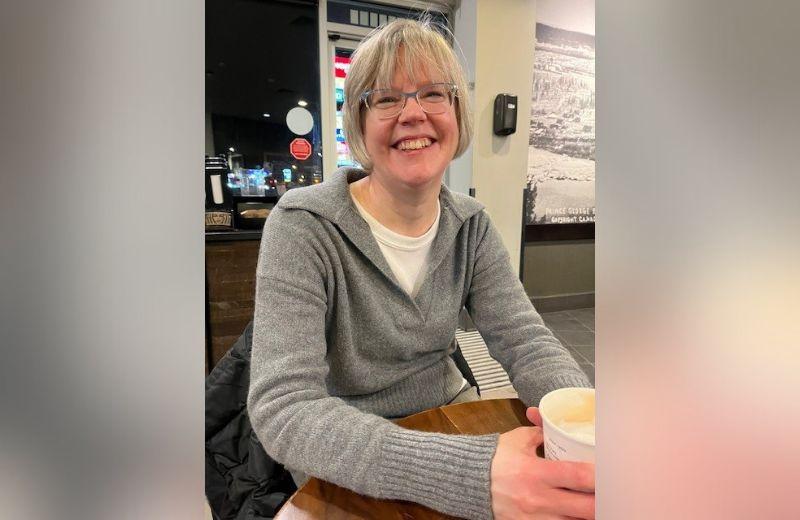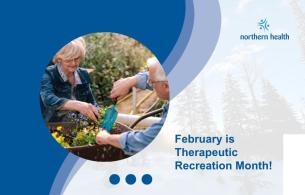Karenza Chui moved to Prince George with her family from England when she was 39 years old. After turning 40, she found out she was eligible for breast screening every two years with a screening mammogram through BC Cancer. She thought of it as “a bit like going to the dentist” and attended regular appointments every other year.
“I wasn’t particularly anxious about the screening and haven’t experienced pain, so I opted for screening over self-checks,” Karenza notes. She felt that the regular screenings helped her be proactive in monitoring her breast health. “I never did it [the self-checks] often enough to know my own lumps.”
“It was fine the first four times I went,” she says, “but this last time, it wasn’t fine. I don’t have a family history of breast cancer, so it was a very unwelcome surprise.”
After her initial screening, she was contacted to return for additional testing. This isn’t always a cause for concern, as more images may be needed for various reasons, and according to radiologist Dr. Karen Seland, “one in ten patients [screened] will be called for additional imaging.”
“They asked me to come back in for more pictures. I had more scans and then had a biopsy done, and I was diagnosed with cancer in the left breast,” says Karenza.
Support close to home
While her initial conversation about treatment took place with her family doctor, Karenza also discussed the options available to her with her surgeon, and later with the oncologists who treated her at the BC Cancer Centre for the North. She was offered several courses of treatment including mastectomy (removal of the breast tissue), reconstruction, and radiation therapy, all of which were available in Prince George.
“I opted for a straight mastectomy and underwent radiation therapy,” says Karenza. “The tumour was far back, so they wanted to make sure they got it all.”
While some people may be given more options for treatment, such as chemotherapy, every patient and every tumour are different. Patients should work with their care providers to figure out what is the best option for them.
As well as doctors, many health care supports are available for people newly diagnosed with cancer. Karenza recalls the wonderful care she received from Northern Health Cancer Care Coordinator and nurse Heather Wozney (now retired). "She answered all of my questions and helped me imagine what my life would be like after it was all over,” she said.
The whirlwind after the diagnosis
After being diagnosed and deciding on a treatment plan, the rest was “a bit of a whirlwind.”
"The scan was at the end of August, surgery was in September, hormone therapy began in November, and radiotherapy took place in December,” said Karenza. This was all just three months before the COVID-19 pandemic was declared, which also had an impact on her aftercare.
“I was later offered the option to have additional hormone injections at the BC Cancer centre or by my GP. I went with my GP as it was during COVID,” she says.
She went to home care to be looked after post-surgery and was given lots of resources as well as contacts to follow up with if she had questions or wanted to connect with others dealing with a cancer diagnosis. Karenza recognizes that this is helpful for many people, but also that people process things in different ways; she didn’t find she particularly needed it.
“I have felt well looked after,” she says, when reflecting on her overall experience.
Breast screening is worth doing
Four years later, Karenza is pleased to note that yearly scans of her remaining breast have been clear. She takes a medication called Tamoxifen to help prevent a recurrence of the cancer, and also receives quarterly hormone injections.
“It’s obviously worth doing the screening,” she says. “I wasn’t sick and hadn’t felt a lump, and they did find something and dealt with it -- and now I’ll live to see my children get married!”
Eligibility for screening mammography is not the same everywhere in the world. Karenza would have had to wait until age 50 if she were still in England, compared to 40 years in British Columbia.
“It was good that I started at 40,” she says.
Karenza is grateful to have had her tumour found early. Her experience is a perfect example of how screening works to detect cancers sooner.
“They find them before you can find them yourself, and increasingly breast cancer can be dealt with,” she says.
Screening mammography is available in Northern BC
Women in Northern BC over the age of 40 can book their own screening mammograms without a referral and without needing to talk to their primary care provider.
Visit the BC Cancer clinic locator to find a screening centre near you, or call 1-800-663-9203 to book your appointment today.














Comments